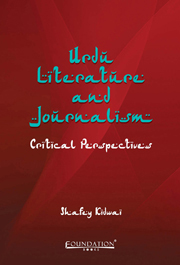Book contents
- Frontmatter
- Dedication
- Contents
- Preface
- Introduction
- Acknowledgements
- 1 Post-Independence Urdu Short Story
- 2 Post-Partition Urdu Poetry
- 3 Structuralism and Post-structuralism in Urdu Criticism
- 4 Jayant Parmar
- 5 Firaq as a Critic
- 6 Ghalib Criticism
- 7 Literature, Culture and Social Consciousness
- 8 The Influence of Tagore on Urdu Literature
- 9 Early Journalistic Endeavours of Sir Syed Ahmad Khan
- 10 Pioneering the First Urdu Book on Journalism
- 11 The Contribution of Urdu Journalists to the First War of Independence
- 12 Abul Kalam Azad's Journalistic Conquests
- Index
10 - Pioneering the First Urdu Book on Journalism
The First Vernacular Book on the Art of Journalism
Published online by Cambridge University Press: 05 October 2014
- Frontmatter
- Dedication
- Contents
- Preface
- Introduction
- Acknowledgements
- 1 Post-Independence Urdu Short Story
- 2 Post-Partition Urdu Poetry
- 3 Structuralism and Post-structuralism in Urdu Criticism
- 4 Jayant Parmar
- 5 Firaq as a Critic
- 6 Ghalib Criticism
- 7 Literature, Culture and Social Consciousness
- 8 The Influence of Tagore on Urdu Literature
- 9 Early Journalistic Endeavours of Sir Syed Ahmad Khan
- 10 Pioneering the First Urdu Book on Journalism
- 11 The Contribution of Urdu Journalists to the First War of Independence
- 12 Abul Kalam Azad's Journalistic Conquests
- Index
Summary
Seldom does a historical fallacy that becomes omnipresent, unwittingly give way to a well-documented and a painstaking research finding. This is the reason that a majority of scholars, who are turning their attention to the history of Indian journalism, still give credit to the Punjab University, Lahore, for launching the first course in journalism as early as in 1941, under the stewardship of Professor Prithivipal Singh. The course was later shifted to Delhi and then to Chandigarh.
Contrary to the widely held view, Professor Nadig Krishnamurthy, in his authentic work on Indian Journalism: Origin, Growth and Development of Indian Journalism from Asoka to Nehru, points out that it was the National University at Adyar (Madras) that first started a full-fledged course in journalism. The course was started because Dr. Annie Besant was deeply interested in imparting professional training to those who wanted to be journalists and the students who joined the course got hands-on training at the office of the New India. (Krishnamurthy, 1966)
Next, it was the turn of the Aligarh Muslim University to introduce journalism as a specialised branch of academic discipline at its campus. According to Krishnamurthy, the Aligarh Muslim University offered a diploma course in Journalism in 1938 (Krishnamurthy, 1966: 174).
- Type
- Chapter
- Information
- Urdu Literature and JournalismCritical Perspectives, pp. 150 - 155Publisher: Foundation BooksPrint publication year: 2014



